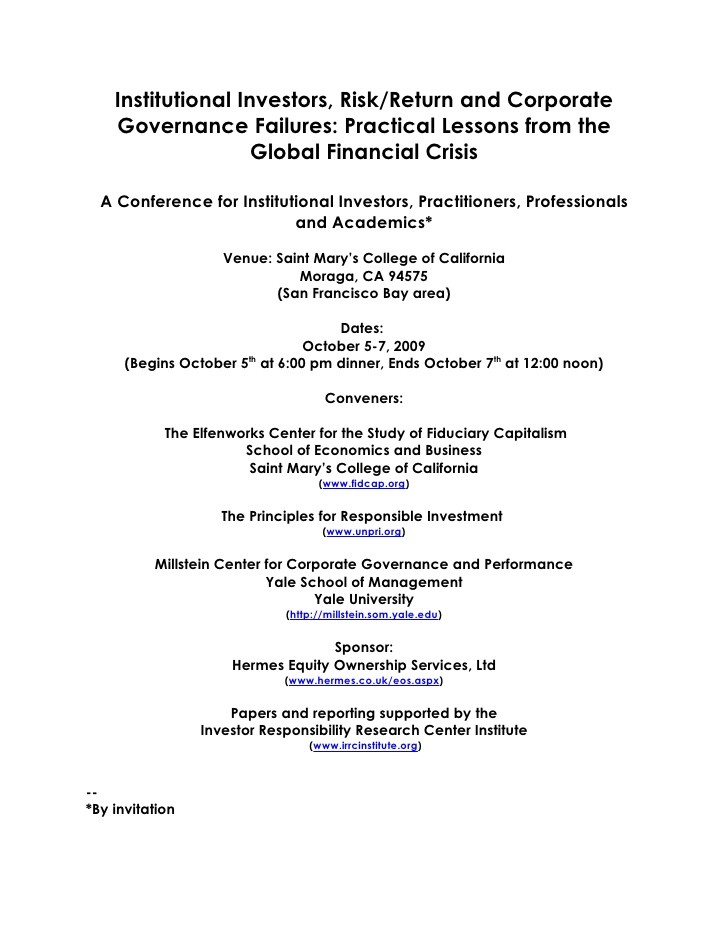Institutional investors and corporate governance
Post on: 4 Июнь, 2015 No Comment

Introduction
As institutionalization is rapidly occurring in the stock markets the world over, evaluation of a corporation’s performance depends on the behaviour of institutional investors. Institutional investors are type of organizations such as banks, life insurance companies, pension fund, mutual fund, investment trust and investment banking who collects a large amount of money and invest them in investment assets, securities and real properties. Institutional investors are assumed to be more knowledgeable and possess a strong ability to protect themselves as they face less protective regulations due to their size, nature of holdings and lack of alternative investment options. However, with the internationalization of cross border portfolios, and the financial crises that have occurred in many parts of the world, corporate governance has become a significant factor considered by institutional investors because they own large portions of equity in many companies across the world (Mallin 2006).
Purpose, Scope and Limitation
The purpose of this report is to identify the issues and discuss the impact of institutional investors’ influence on corporate management and corporate governance in three different markets such as United Kingdom (UK), Australia and United States (US).
Sources and methods
In preparing this report, I have used the following resources:
- Library e-resource
- Corporate Governance books and lecture notes
- Journals
- Articles
- Web browsing
Definition of Corporate Governance
The corporate governance differ by various countries, but institutional investors views the definition of corporate governance as the process of supervision and control intended to ensure that the company’s management acts in accordance with the interest of shareholders (Solomon, 2007).
The Corporate Governance Problem
Puri and Larsen (2004) has identified the Agency problem* (conflict of interest) between shareholders and manager in UK, Australia and US because these countries have a significant concentration of share ownership.
- Managers of corporation operate the corporation, but do not bear the full risks and benefits of the corporation. Therefore, the interests of managers and shareholders may not be aligned and managers may not act in the interests of shareholders.
- Shareholders are typically not interested to control managers since the costs of monitoring usually outweigh the benefits.
- Fairness difficulties associated with corporate governance monitoring.
- Directors many not be effectively monitor management since management typically pick the directors they can feel obliged to management or directors may not have time and expertise to effectively monitor management.
*The agency relationship is whereby the principal (owner/shareholder) transfer decision rights to the agent (manager).
To support the identified corporate governance problem, Solomon (2007) highlights the following examples of corporate governance failures in large companies.
Australia: National Australian Bank (NAB), largest financial services institution lost $360 million due to rogue trading and 6% of turnover because of lack of good management, public accountability and auditor independence.
US: Enron, one of the large energy based company in the US, lost $1.2 billion due to corporate governance weaknesses, fraudulent activity and entrepreneurial culture.
UK, US and Australia: HIH Group, a largest insurer of Australia, lost $5.3 billion due to lack of attention detail, lack of accountability, lack of integrity and mismanagement decision entering into US and UK market.

These collapses have led to increasing public and government concern over the lack of good management practice and public accountability as well as increased the monitoring role of institutional investors as they have grown largely and influential, at the same time gaining significant ownership concentration in corporation (Solomon, 2007).
The Institutional Investors as Monitor
Reasons why institutional investors should be good corporate governance monitors:
- They are not shareholders but a large intermediary who can solve agency problems because of their ability to take advantage of economies of scale and diversification (Diamond, 1984).
- Shareholders needed mechanism designed to align the interests of management with their interests.
- There is no reason for one owner to monitor corporate otherwise one owner will bear the entire monitoring cost while all shareholders would enjoy the benefits.
Below are the examples which concluded that company’s performance improves after an activist investor purchase a block of shares, large shareholders is associated with increased management turnover and presence of large shareholders on the board is associated with tighter control over executive compensation (Gillan and Starks et al. 2003).
Kingfisher Plc: is UK based international retailer and is engaged in constructive dialogue with its institutional shareholders and changed certain aspects of its directors’ remuneration packages after criticism from its institutional shareholders.
Xerox Corporation: is one of the largest and most influential pension funds in US and is active in pursuing good corporate governance with its investee companies which is an example of the use of a focus list by an institutional investor to highlight poor corporate governance.
Corporate Governance in United Kingdom (UK) and Key Issues
The ownership and control structure of public companies in the UK is primarily in respect of shares held by institutional investors. In the UK, these institutional investors are mainly comprised pension funds and insurance companies. Ferguson (2002) states that the poor economic performance and a number of major corporate scandals in 1990s, the profile of corporate governance increased significantly and resulted in a decade of debate and development on issues surrounding governance and transparency. Consequently, the focus of influencing corporate governance practices in the UK has been directed towards institutional investors because the statistics shows about 70% institutional investors possess an ownership of UK listed companies (Agrawal and Knoeber 1996).
The Role of Institutional Investor
Two methods to exercise control over the managers of their company (Keong, 2002):
- Voting rights: The right is normally attached to ordinary shares which confer the right of owner to vote at shareholder’s meeting.
- Market forces: where shareholder can express dissatisfaction by selling their shares in an active market.
However, selling shares is not a remedy open to institutional investor in practice because of the influence of other variables such as house policy or economic consideration.
Influence of Institutional Investors
According to Institutional Shareholders’ Committee* (ISC), institutional investors can have a lot influence in corporate management and corporate governance such as:
- Reduce the board size and increase the board independence
- If the company performs poorly, then take action against directors (appoint new director or dismiss director)
- Reduce the rates of increase in salary, benefits and bonuses
- Require corporation to purchase audit service from large audit firm to ensure high audit quality
- Change the nature of business
- Wind up the company
*Institutional Shareholders’ Committee sets out the principles and responsibilities of institutional investors in UK.
Corporate Governance in Australia and Key Issues
Australia has been characterised as the Anglo-American model* based upon the primacy of shareholders. Since the late 1980s, issues of corporate governance have become increasingly contemporary in Australia; institutional investors have taken a closer interest in issues like corporate ownership structure, board structure and composition, directors and officer’s legal duties (Keong, 2002).
Role of Institutional Investors
Influence of Institutional Investor
KEONG
- Proxy voting*
- Improve conflict of interest- Make sure managers and directors act in the best interest of shareholders
- Maintain routine contact with the companies in which they hold shares
- Dialogue with independent non-executive directors
- If dissatisfy with the corporate performance, they have three main options.
- Sell the shares- Difficult
- Intervene- reovlve around the share price
- Do nothing
*Proxy-voting is the procedure for the delegation, means members power to vote for another member in his absence.














